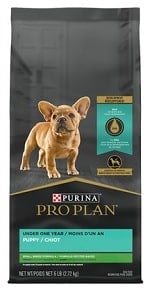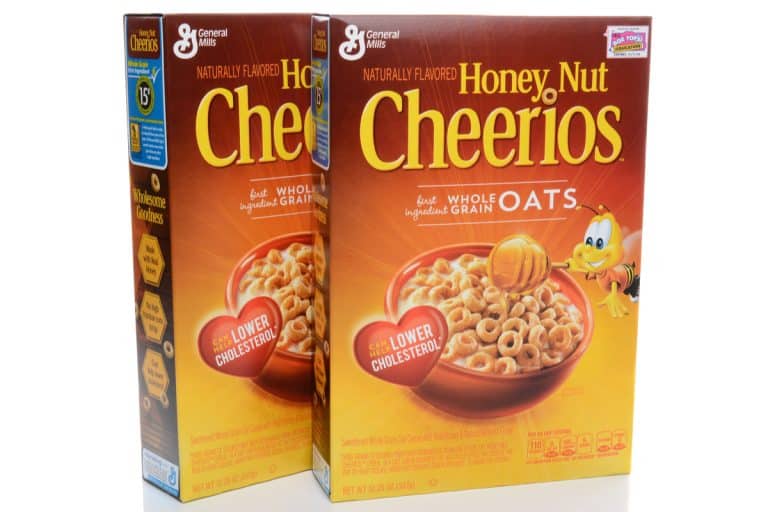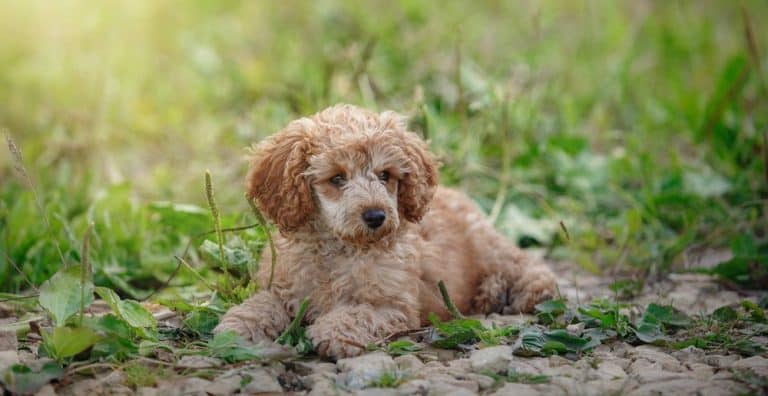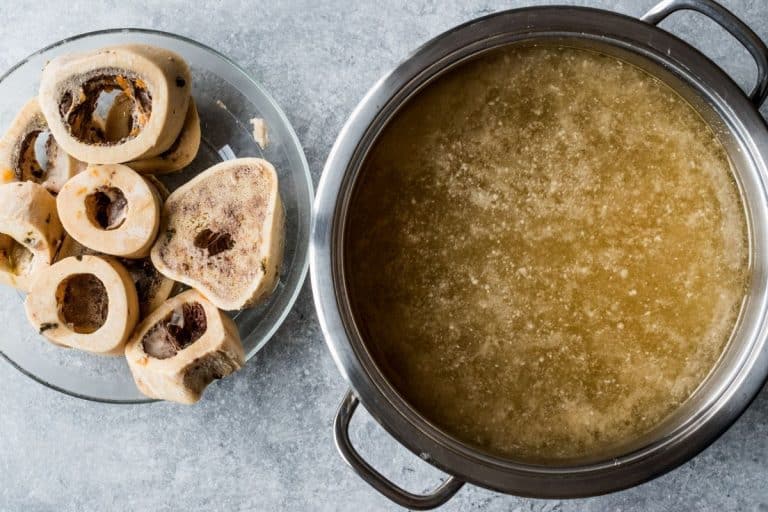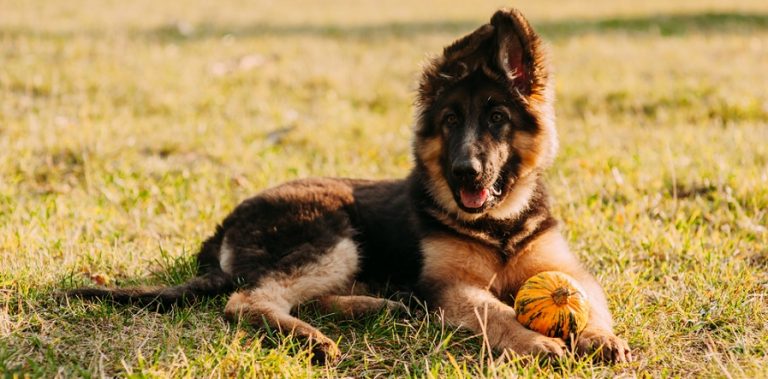How Much To Feed A French Bulldog Puppy? Frenchie Feeding Chart
Getting a new puppy comes with a lot of responsibilities. Principally, you need to feed them properly.
French Bulldogs are sensitive and if you don’t feed them properly, they may develop health problems.
In fact, what they eat as a young puppy, affects their well-being throughout their lives. And that is why knowing how much to feed a French Bulldog puppy is very important.
In order to make sure that your French Bulldog is a healthy dog, you must make sure it gets three balanced meals a day. What he needs is high-quality puppy food with plenty of protein and vitamins.
If you don’t know what food to buy, consult your vet or an experienced dog breeder.
How Much Should A French Bulldog Puppy Eat?
The recommended daily amount is 1 to 1.5 cups of high-quality dry food a day. Most dog owners divide this into two or more meals during the day. Three meals seem to be the best as .75 cup is rather a big meal for a small dog.
Keep in mind that the quantity your dog eats depends on a number of factors, including his size, metabolism, and activity levels.
A very active dog will have a big appetite and might demand more than the recommended portion.
Also, bear in mind that the quality of the dog food also plays a role – the higher the quality of the food, the less your dog will need.
French Bulldog Puppy Feeding Chart
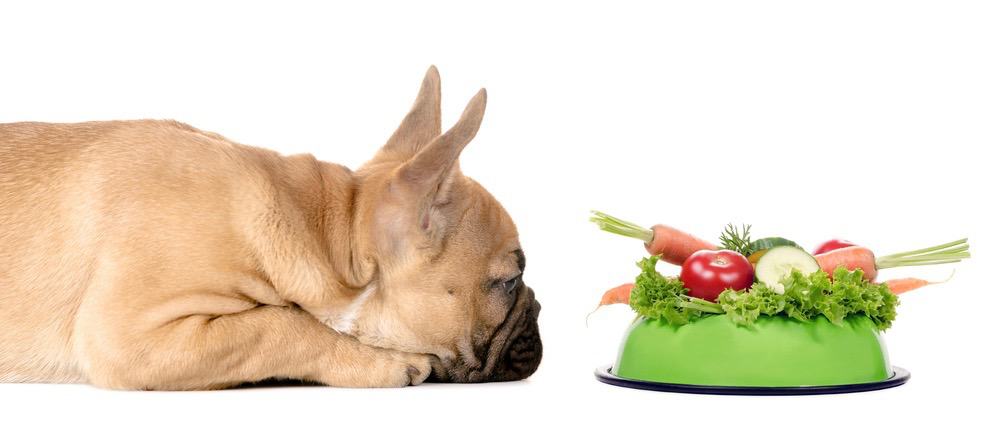
To help you decide how much you should feed your puppy, which can be a tricky decision, you can consult the French Bulldog puppy feeding chart below.
As a general rule, a French Bulldog puppy aged 8 to 12 weeks should get around 1 and a half cups of food a day, separated into three meals. As your dog matures, the amount of food he’ll need will change.
The French Bulldog feeding chart gives the weight of a puppy and the amount of food a normal dog should get and the adjusted amount for a very active dog.
For instance, a dog weighing 9 kgs should get 1.5 cups of food and an active dog weighing 9 kgs should get 1.75 cups.
2 Week Old French Bulldog Puppy
In the first 4 weeks, you should be careful to keep newborn puppies sterile to avoid the risk of disease. Keep them in the house and only allow a limited number of people to handle them.
A puppy of 2- 3 weeks is beginning to respond to sounds and his eyes are fully opened. He’s beginning to make all sorts of noises like yelping, whining, and even some attempts at barking.
Your puppy should have doubled his birth weight by now. He still needs to nurse every 4 – 6 hours.
He is more active and can urinate and defecate on his own. He is ready to be dewormed and his mother can leave him on his own for extended times.
However, a puppy this young should not be weaned and taken away from his mother.
4 Week Old French Bulldog Puppy
A 4-week old French Bulldog puppy will still be nursing every 4-8 hours. At this point, you can consider starting them on puppy mush.
Some owners give raw beef mixed with a special formula, others give kibble. Some dog breeders favor raw feeding for the prevention of disease.
At this stage, little puppies become more playful and venture out of their sleeping area. This is a good time to introduce him to a separate area to perform his toilet.
Now is the time to introduce your dog to the water. Be sure to buy a low-profile puppy feeding bowl and don’t put more than 1/2-1 inch of water in it.
6 Week Old French Bulldog Puppy
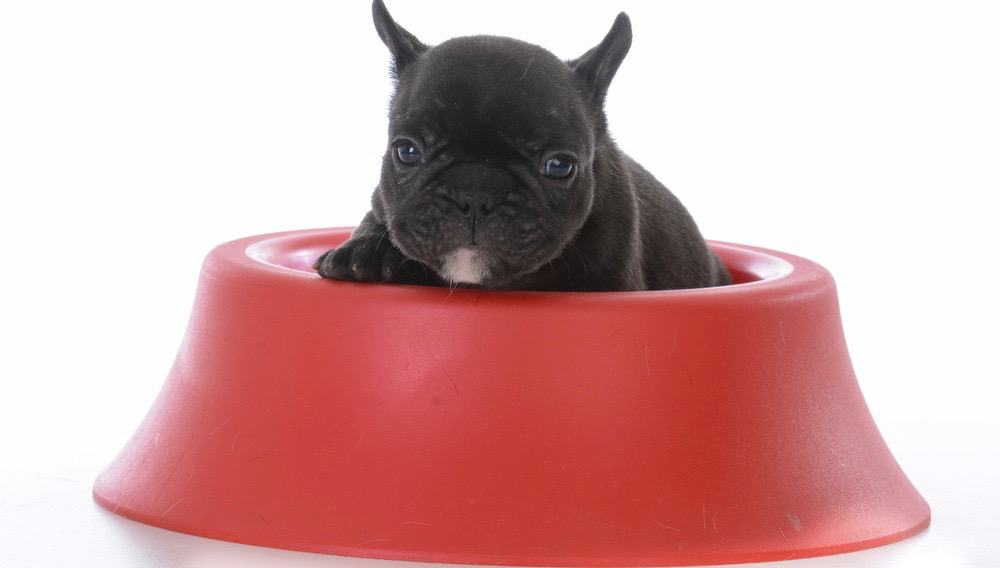
6 weeks old French Bulldog puppies are fully aware of their environment and go out exploring at every opportunity. They are curious about other animals. House training is going on in earnest.
Puppies are now eating solid food, often in the form of ground raw food high in proteins supplemented with vitamins.
This is also the stage when puppies start to receive their first vaccinations. The initial vaccinations are followed up with boosters every couple of weeks.
This is the time when your puppy’s teeth will start to come out. Like human babies, this is an uncomfortable time for a puppy.
8 Week Old French Bulldog Puppy
By 8 to 12 weeks old, puppies should get about 1.5 cups of food a day, spread over three meals. This food should be high in calories, proteins, and other nutrients that they need to flourish.
You can feed your puppy raw food at this stage.
Your friendly puppy now develops a distrust of the unknown, including people and other dogs. It’s important to take care to socialize your puppy properly.
With attention and training, puppies start to develop their social skills and they learn where they fit into their pack.
10 Week Old Bulldog Puppy
By this time, you should have established a fixed eating routine for your dog. French Bulldogs are most comfortable and happy if they’re fed the same time every day.
This is also the time that you can consider gradually introducing adult dog food to your puppy. If you have a small dog, you may want to wait until he’s a year old.
Puppies should still receive 1.5 cups of food per day, spread over three meals.
12 Week Old French Bulldog Puppy
At this age your dog still needs 1.5 cups of puppy food per day spread over three meals of ½ cup each. Stick to this routine and don’t be tempted to give your dog more food.
He will definitely eat more if you offer it to him, but it’s really bad for his health. French Bulldogs tend to put on weight easily and develop health problems as a result.
Towards the end of the 12 weeks, it’s time to fetch your French Bulldog puppy from the breeder.
How Many Calories Does a French Bulldog Puppy Need?

Certain factors affect the amount of food your French Bulldog needs such as activity level, health, age, and weight.
As your French Bulldog puppy get older, the number of calories they are eating should increase according to their weight. You should feed your puppy 12 to 30 calories per pound of their body weight.
To know exactly how many calories your puppy should eat daily according to their weight, calculate their Resting Energy Requirement (RER) and multiply by two. The formula of RER is 70(weight in kg)3/4.
For instance, if your French Bulldog weighs 5kg their RER is 70(5)3/4 = 79. Therefore, your puppy’s daily caloric intake is 79 multiplied by 2 which is 158. If you are not sure how much to feed your French Bulldog puppy, consult your vet.
Can You Free Feed a French Bulldog Puppy?
Free feeding is the act of allowing your French Bulldog puppy to have constant access to food throughout the day. Free feeding is convenient and easy for you, but it is not beneficial for your puppy’s health.
Free feeding your French Bulldog can cause them to be overweight because they do not have the self-control to stop eating when full.
Leaving food in your puppy’s bowl all day can be less appealing and can go bad especially if it is wet food. Free feeding also makes it difficult for you to train your puppy and track the amount of food they are eating.
Should You Feed Your French Bulldog Puppy Dry or Wet Food?
Feeding your French Bulldog dry or wet food depend on your budget, your puppy’s preference, and their health.
Dry foods are easy to store, affordable, and contribute to your puppy’s dental hygiene by cleaning their teeth to prevent plaque build-up.
Wet foods are easy to chew especially for young puppies and have high moisture content which keeps your French Bulldog hydrated. The moisture in wet food reduces the risk of urinary infections and other related issues.
Some owners choose to feed their puppies a mix of wet and dry food. If you choose this method, consult with your vet before deciding to avoid causing health problems in your puppy.
Can You Feed a French Bulldog Puppy Raw Food?
Yes, your French Bulldog can eat raw foods. If you choose to give your puppy raw foods, ensure that they are eating 25% to 75% of meat depending on their energy level and size.
Your puppy also needs organ meat such as spleen, kidneys, pancreas, and brain, which should be about 5% to 10% of the diet.
In addition, feed your puppy grains, fruits, and supplements as part of the raw food diet. Feeding your puppy raw foods means that you know exactly what goes into their food and there are no additives, fillers, or preservatives.
However, raw foods can cause bacterial infections if the meats are untreated or uncooked. Bones in raw foods can choke your puppy or break his delicate teeth.
French Bulldog puppies require food three to four times per day while adult Bulldogs need food twice per day.
What Human Foods Can a French Bulldog Puppy Eat
Certain human foods are safe for your French Bulldog puppy to eat. Fruits and vegetables such as apples, broccoli, bananas, mango, and blueberries are safe for your puppy.
Yogurt has active bacteria which helps improve the digestive system of your puppy.
Other safe human foods for your puppy include cheese, chicken, turkey, salmon, tuna, sweet potatoes, rice, and pumpkin. All these foods contain the essential nutrients that your puppy needs to grow strong and healthy.
What Human Foods Are Dangerous for A French Bulldog Puppy?
Certain human foods may not be safe for your French Bulldog because they contain compounds that are toxic for your puppy.
Chocolate is the most dangerous food for your puppy because it contains theobromine which can cause seizures, tremors, abnormal heartbeat, or even death.
Other foods not suitable for a French Bulldog puppy include garlic, onions, chives, leeks, candy, baked goods, fruit drinks, and cereals.
Best Dog Food For French Bulldog Puppies
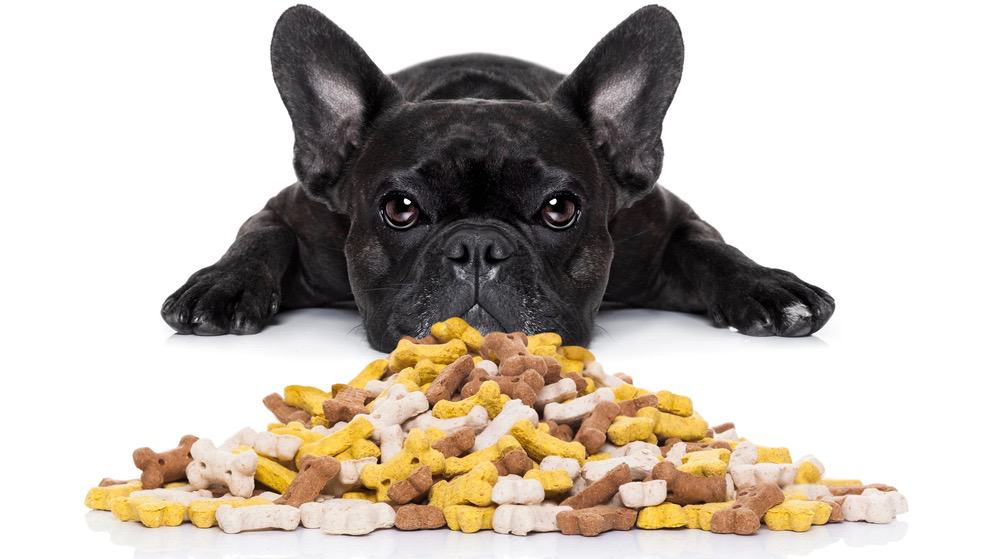
Editor’s Choice
#1. Purina Pro Plan Puppy Dog Food
This brand of dog food was specially designed for purebred French Bulldog puppies under 12 months of age. The special formula will boost your dog’s immune system and help your puppy to grow during his first year of life.
The kibble was designed with the short muzzle and brachycephalic jaw of French Bulldogs in mind – your dog won’t have any problems picking up his food with his mouth.
The formula is good for your dog’s digestive system and it contains all the vitamins, minerals, and antioxidants your dog needs to flourish.
Runner-Up
#2. Taste of the Wild Appalachian Valley Small Breed Dog Food
This is a grain-free formula that contains real venison as the main ingredient combined with protein-rich foods like lamb, egg, duck, and ocean fish.
The recipe also includes vitamins and antioxidants derived from fruit and vegetables. The formula is enhanced with a proprietary K9 strain probiotic blend that helps your dog’s digestive system.
This superior dog food doesn’t contain any grains, fillers, artificial flavors, colors or preservatives. The food comes in small-size kibble which is perfect for small breeds’ teeth.
This recipe is rich in proteins, antioxidants, and fat providing small dogs with all the nutrition they need.
Budget Friendly
#3. Nutro Wholesome Essentials Puppy Dog Food
This dog food was developed with the needs of growing puppies in mind. The kibble is full of omega-3 fatty acids, calcium, and protein. The source of the protein is farm-raised chicken.
The ingredients used to make the kibble are of non-GMO origin. It is a completely natural product and contains no artificial flavors, colors, or preservatives. Neither does it contain any chicken by-product meal, corn, wheat, or soy protein.
With this food, your puppy’s bones will be strong and his joints will be healthy.
#4. Blue Buffalo Life Protection Formula Small Breed Puppy Dog Food
This formula was specially developed to support the health and growth of puppies and small breeds. The main ingredient is deboned chicken for protein.
The formula also contains whole grains, vegetables, and fruit. To that is added LifeSource Bits.
For extra health-giving nutrition, the recipe includes calcium, phosphorus, and essential vitamins to support healthy growth. This nutritious recipe also contains omega acids for eye and brain health and antioxidants to support your dog’s immune system.
The kibble is a custom-made kibble for smaller jaws.
#5. Hill’s Science Diet Dog Food
This dog food is custom-developed for small dog breeds. The source of protein is chicken and the formula contains prebiotic fiber for digestive health.
The food contains vitamin E, antioxidants, and omega-6 fatty acids and is formulated to give your dog a healthy skin and a lustrous coat.
The food comes in the form of small kibble specifically for small and toy breed dogs.
This dry dog food is formulated by Hill’s, a well-known brand in the pet food industry.
2 Month Old French Bulldog Puppy Weight
A 2-month-old French Bulldog puppy weighs 5.0 – 6.9 lbs.
You will notice that the weight varies quite a bit. That is because males weigh heavier than females and some dogs are smaller, so they weigh less. Your dog should fall somewhere within the range.
3 Month Old French Bulldog Puppy Weight
A 3-month-old French Bulldog puppy weighs 6.2 – 9.0 lbs. A small puppy would only gain about a pound, but if you have a big puppy, you can expect it to gain two pounds in one month.
4 Month Old French Bulldog Puppy Weight
By the 4-month-mark, a French Bulldog puppy weighs 9.0 – 12.00 lbs. Both a small puppy and a big puppy will gain almost 3 pounds in this one month.
How Much Do French Bulldogs Grow Each Week?
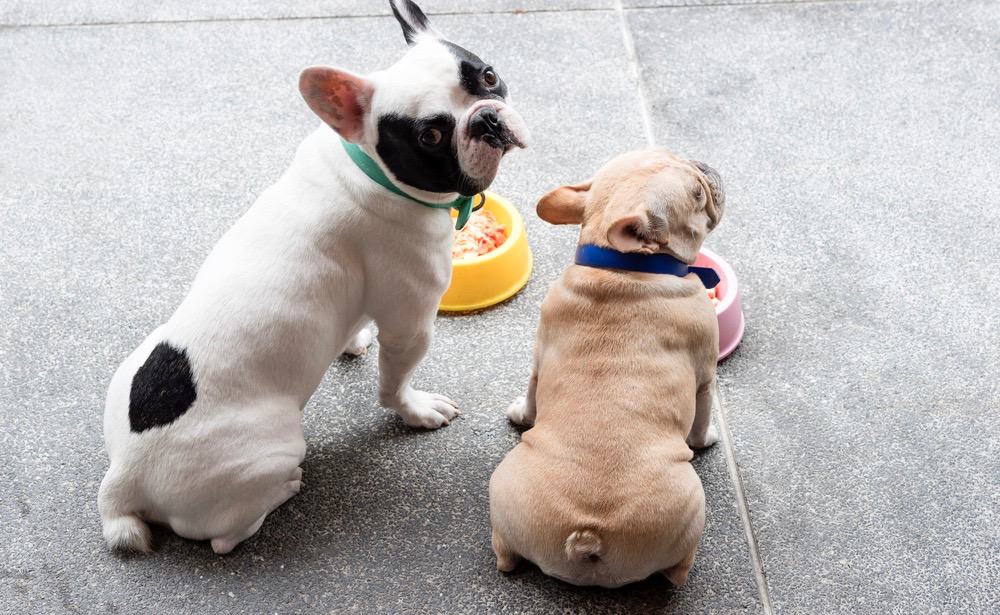
A French Bulldog is a small dog that doesn’t grow much in height. By 3 months, these dogs are on average only 5 – 6 inches tall.
Three months later, at the age of 6 months, all puppies have grown another 2 inches. By the time they reach 9 months. They are between 10 and 11 inches tall. In the eleventh month, they grow another inch.
By the time the puppies are one year old, they are between 11 and 12 inches tall, so there is not much of a difference in height between the smaller dogs and the bigger dogs.
Switching from French Bulldog Puppy Food to Adult Food
You may want to know when you should switch your dog’s food from puppy food to adult food. You can do this when your puppy is a year old. When French Bulldog puppies turn one year they are regarded as adults.
It is not a good idea to do a sudden complete switch. You should gradually introduce your dog to his new food. Do this by swapping a bit of the old food for the new food and mix it in with the new food.
Start the change by giving your dog ¼ new food and ¾ old food for a few days. Then, give the dog half, half for a few days, and lastly, give him ¾ new food and ¼ old food for another few days. If your dog seems happy, change to just the new food.
As for the choice of adult food, a good rule of thumb is to choose an adult food that is made of similar ingredients as the puppy food your dog is used to.
What If My French Bulldog Puppy Won’t Eat
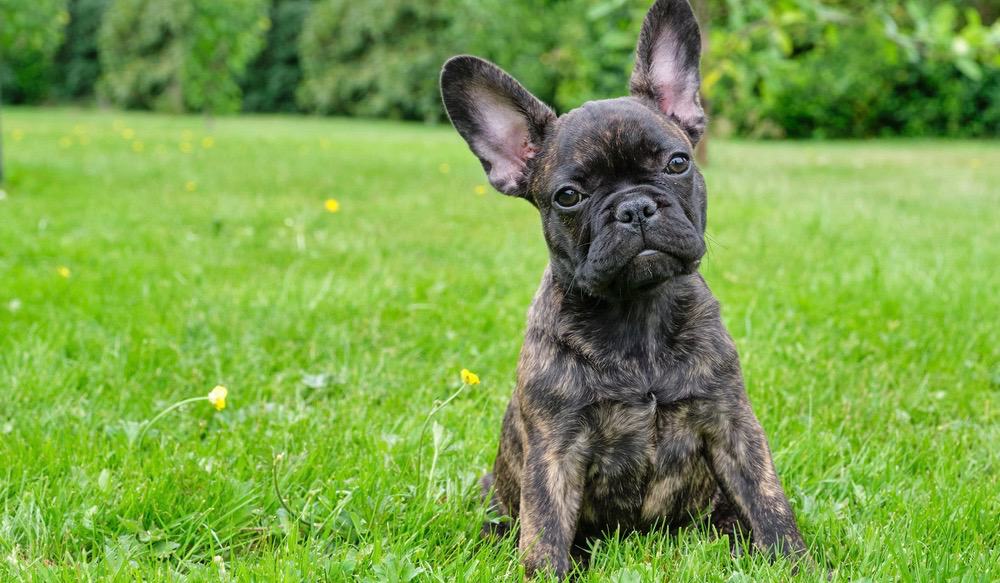
When French Bulldog puppies get stressed they might stop eating. There are many reasons why your dog might be stressed – maybe you just moved or acquired a new baby, or your puppy has been taken away from his pack to come and live with you.
This is natural and to be expected. If he doesn’t eat for a day or so, don’t worry too much. Make sure you feed him the same food he was used to.
If that doesn’t work after a day or two, you can try wet or raw food if he was used to dry food. The change might interest him.
If none of these steps work, it’s best to take him to the vet for an assessment.
What Nutrients Does a French Bulldog Puppy Need?
French Bulldogs need a balanced diet with a complete range of nutrients for optimal health.
The food should preferably be made of natural ingredients and should primarily contain high-quality protein derived from chicken, eggs, lamb, duck, and venison. This ensures healthy muscle growth.
Minerals like calcium and phosphorus should be included for strong bones and teeth.
Dogs also need essential vitamins, chelated minerals, and antioxidants for a healthy immune system. The formula should also include vitamin E and omega-6 fatty acids to ensure healthy skin and a glossy coat.
The formula should include prebiotic fiber as well as probiotics to support healthy digestion.
Should You Feed a French Bulldog Puppy Supplements?
If you feed your dog one of the top-quality dog food brands that we have discussed, it’s unlikely that your dog would need supplements. Read the label of dog food brands carefully and buy a reputable brand.
If you notice that your dog shows signs of not being one hundred percent, if he’s restless and has little energy, it might be time to consider supplements.
A lot of dogs eventually need supplements because they might develop an increased need for nutrients as they grow older and they might not get enough of if it from their food.
The best is to consult your vet if you have any doubts.
How Much Water Should a French Bulldog Puppy Drink?
Most dogs, including puppies, naturally drink the right amount of water. If you keep drinking water in a clean bowl available, your dog will drink enough water.
As a general rule, young puppies need about one-half cup of water every two hours. When they get older, they generally need between a one-half ounce and one ounce of water per pound of bodyweight a day.
So, if your dog weighs 16 pounds, he’ll need somewhere between 8 and 16 ounces of water in a day. That is 1 – 2 cups of water per day.
If you feed your dog dry food, make sure that he drinks enough water after he’s eaten. Also, if the two of you have been running around, he’ll need more water.
How Much Exercise Does A French Bulldog Puppy Need A Day?
French Bulldogs are a lively breed that likes to be active. They need at least an hour of exercise every day.
This can take the form of short walks around the house or a longer walk in the park. Of course, entertaining your dog with a favorite toy can also do the trick.
Whatever you do, don’t let your dog grow into a couch potato – it’s not healthy and will shorten his time with you.
Keep in mind that brachycephalic (short-nosed) dog breeds can have trouble breathing and should not be over-exercised, especially in hot weather. When it’s too hot outside, play with your dog indoors for exercise.

